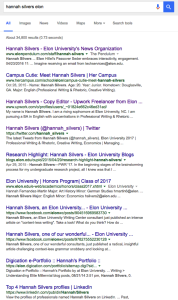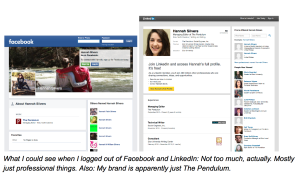Guest Blogger Hannah Silvers ’17
Personal branding is easier than ever. There are too many avenues to count that you can use to get yourself out there — whether it’s a personal website, a LinkedIn page or a professional Twitter account, you can show the world of potential employers as much of your work as you’d like.
But of course, personal branding is also harder than ever. The work you want employers to see isn’t the only information they can see. The online portfolio you spent so long curating and designing could end up buried below your MySpace, untouched since 2007.
So what can you do to save your personal brand?
Easy! You can stalk yourself.
It’s easy enough to delete your MySpace or untag yourself from unflattering pictures if you know that you need to. Often, though, we don’t remember those accounts we set up and used for a few months before forgetting the password. Simply typing your name into Google and adding “Elon” or your hometown can give you an idea of what an employer could find about you on a cursory search.
 [Here’s what I found from stalking myself on a computer where I wasn’t logged into anything: Lots of blog posts and articles written about my writing and research, a few things I’ve written, and (surprisingly high up on the list) a blog post a friend wrote about me for Her Campus. I wonder if potential employers care that butter pecan is my favorite flavor of ice cream.]
[Here’s what I found from stalking myself on a computer where I wasn’t logged into anything: Lots of blog posts and articles written about my writing and research, a few things I’ve written, and (surprisingly high up on the list) a blog post a friend wrote about me for Her Campus. I wonder if potential employers care that butter pecan is my favorite flavor of ice cream.]
Don’t forget to log out of your browser or social media accounts — or at use a different computer — when stalking yourself. That way, you get a better idea of what someone who isn’t you can find about you. There are features within most of these websites that allow you to “view” your profile from different types of users, like friends/connections, friends of friends, or someone without an account. But while those tools are useful, logging out is the only way to make sure what you’re seeing is actually what someone with no connection to you would see.
Stalking yourself isn’t all about untagging yourself from party photos to save face — it’s a rhetorical action based on building your ethos. Delete those accounts that don’t help you come across the way you want to come across as a professional, or at least lock down your privacy settings. Use your Google searching to uncover inconsistencies with the images, words and tones you use across different accounts and platforms, then go in and standardize them to present a clear, unified image to anyone searching for your work.
 [Side note: Want Google to help you keep on top of what’s being published about you? You can set up Google Alerts of any keywords, including your name or email address, here. Google will automatically send you emails as often as you’d like.]
[Side note: Want Google to help you keep on top of what’s being published about you? You can set up Google Alerts of any keywords, including your name or email address, here. Google will automatically send you emails as often as you’d like.]
Think about it this way: Your personal brand is what builds your credibility, or ethos, with potential employers. By taking control of your personal brand, you’re controlling how your audience perceives you as the author in the rhetorical situation — and, thus, how effective your arguments based on your ethos can be. And when it comes to interviewing for a new job, arguments based on ethos are always at the forefront. You have to show potential employers that you have the experience and the sensibilities to fulfill the role you’re applying for.
Be sure you take a critical approach to what you find. Keep your audience and your personal brand in mind, and delete what doesn’t help you build your ethos.
Happy stalking!

 Follow
Follow